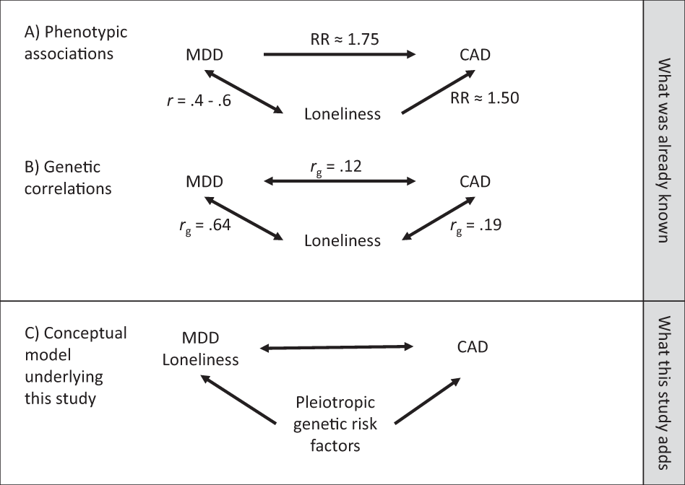当前位置:
X-MOL 学术
›
Mol. Psychiatry
›
论文详情
Our official English website, www.x-mol.net, welcomes your
feedback! (Note: you will need to create a separate account there.)
Genetic risk for major depressive disorder and loneliness in sex-specific associations with coronary artery disease.
Molecular Psychiatry ( IF 9.6 ) Pub Date : 2019-12-03 , DOI: 10.1038/s41380-019-0614-y Jessica Dennis 1, 2 , Julia Sealock 1, 2 , Rebecca T Levinson 2, 3 , Eric Farber-Eger 4 , Jacob Franco 5 , Sarah Fong 1, 2 , Peter Straub 1, 2 , Donald Hucks 1, 2 , Wen-Liang Song 3 , MacRae F Linton 3 , Pierre Fontanillas 6 , Sarah L Elson 6 , Douglas Ruderfer 1, 2 , Abdel Abdellaoui 7, 8 , Sandra Sanchez-Roige 9 , Abraham A Palmer 9, 10 , Dorret I Boomsma 11, 12 , Nancy J Cox 1, 2 , Guanhua Chen 13 , Jonathan D Mosley 14 , Quinn S Wells 3 , Lea K Davis 1, 2
Molecular Psychiatry ( IF 9.6 ) Pub Date : 2019-12-03 , DOI: 10.1038/s41380-019-0614-y Jessica Dennis 1, 2 , Julia Sealock 1, 2 , Rebecca T Levinson 2, 3 , Eric Farber-Eger 4 , Jacob Franco 5 , Sarah Fong 1, 2 , Peter Straub 1, 2 , Donald Hucks 1, 2 , Wen-Liang Song 3 , MacRae F Linton 3 , Pierre Fontanillas 6 , Sarah L Elson 6 , Douglas Ruderfer 1, 2 , Abdel Abdellaoui 7, 8 , Sandra Sanchez-Roige 9 , Abraham A Palmer 9, 10 , Dorret I Boomsma 11, 12 , Nancy J Cox 1, 2 , Guanhua Chen 13 , Jonathan D Mosley 14 , Quinn S Wells 3 , Lea K Davis 1, 2
Affiliation

|
Major depressive disorder (MDD) and loneliness are phenotypically and genetically correlated with coronary artery disease (CAD), but whether these associations are explained by pleiotropic genetic variants or shared comorbidities is unclear. To tease apart these scenarios, we first assessed the medical morbidity pattern associated with genetic risk factors for MDD and loneliness by conducting a phenome-wide association study in 18,385 European-ancestry individuals in the Vanderbilt University Medical Center biobank, BioVU. Polygenic scores for MDD and loneliness were developed for each person using previously published meta-GWAS summary statistics, and were tested for association with 882 clinical diagnoses ascertained via billing codes in electronic health records. We discovered strong associations with heart disease diagnoses, and next embarked on targeted analyses of CAD in 3893 cases and 4197 controls. We found odds ratios of 1.11 (95% CI, 1.04-1.18; P 8.43 × 10-4) and 1.13 (95% CI, 1.07-1.20; P 4.51 × 10-6) per 1-SD increase in the polygenic scores for MDD and loneliness, respectively. Results were similar in patients without psychiatric symptoms, and the increased risk persisted in females even after adjusting for multiple conventional risk factors and a polygenic score for CAD. In a final sensitivity analysis, we statistically adjusted for the genetic correlation between MDD and loneliness and re-computed polygenic scores. The polygenic score unique to loneliness remained associated with CAD (OR 1.09, 95% CI 1.03-1.15; P 0.002), while the polygenic score unique to MDD did not (OR 1.00, 95% CI 0.95-1.06; P 0.97). Our replication sample was the Atherosclerosis Risk in Communities (ARIC) cohort of 7197 European-ancestry participants (1598 incident CAD cases). In ARIC, polygenic scores for MDD and loneliness were associated with hazard ratios of 1.07 (95% CI, 0.99-1.14; P = 0.07) and 1.07 (1.01-1.15; P = 0.03), respectively, and we replicated findings from the BioVU sensitivity analyses. We conclude that genetic risk factors for MDD and loneliness act pleiotropically to increase CAD risk in females.
中文翻译:

重度抑郁症的遗传风险和与冠状动脉疾病的性别特定关联中的孤独感。
重度抑郁症 (MDD) 和孤独感在表型和遗传学上与冠状动脉疾病 (CAD) 相关,但尚不清楚这些关联是否可以用多效性遗传变异或共同的合并症来解释。为了梳理这些情景,我们首先评估了与 MDD 和孤独的遗传风险因素相关的医学发病模式,方法是对范德比尔特大学医学中心生物库 BioVU 的 18,385 名欧洲血统个体进行全表型关联研究。使用先前发布的元 GWAS 汇总统计数据为每个人开发了 MDD 和孤独的多基因评分,并测试了与通过电子健康记录中的账单代码确定的 882 项临床诊断的关联。我们发现与心脏病诊断有很强的关联,接下来开始对 3893 个病例和 4197 个对照进行 CAD 的靶向分析。我们发现多基因评分每增加 1-SD,比值比为 1.11(95% CI,1.04-1.18;P 8.43 × 10-4)和 1.13(95% CI,1.07-1.20;P 4.51 × 10-6)分别是 MDD 和孤独。没有精神症状的患者的结果相似,即使在调整了多个常规危险因素和 CAD 的多基因评分后,女性的风险仍然增加。在最终的敏感性分析中,我们对 MDD 和孤独感之间的遗传相关性进行了统计调整,并重新计算了多基因评分。孤独感特有的多基因评分仍然与 CAD 相关(OR 1.09,95% CI 1.03-1.15;P = 0.002),而 MDD 特有的多基因评分则没有(OR 1.00,95% CI 0.95-1.06;P = 0.97)。我们的复制样本是 7197 名欧洲血统参与者(1598 例 CAD 病例)的社区动脉粥样硬化风险 (ARIC) 队列。在 ARIC 中,MDD 和孤独的多基因评分分别与 1.07(95% CI,0.99-1.14;P = 0.07)和 1.07(1.01-1.15;P = 0.03)的风险比相关,我们复制了 BioVU 的发现敏感性分析。我们得出结论,MDD 和孤独感的遗传风险因素具有多效性,可增加女性的 CAD 风险。
更新日期:2019-12-04
中文翻译:

重度抑郁症的遗传风险和与冠状动脉疾病的性别特定关联中的孤独感。
重度抑郁症 (MDD) 和孤独感在表型和遗传学上与冠状动脉疾病 (CAD) 相关,但尚不清楚这些关联是否可以用多效性遗传变异或共同的合并症来解释。为了梳理这些情景,我们首先评估了与 MDD 和孤独的遗传风险因素相关的医学发病模式,方法是对范德比尔特大学医学中心生物库 BioVU 的 18,385 名欧洲血统个体进行全表型关联研究。使用先前发布的元 GWAS 汇总统计数据为每个人开发了 MDD 和孤独的多基因评分,并测试了与通过电子健康记录中的账单代码确定的 882 项临床诊断的关联。我们发现与心脏病诊断有很强的关联,接下来开始对 3893 个病例和 4197 个对照进行 CAD 的靶向分析。我们发现多基因评分每增加 1-SD,比值比为 1.11(95% CI,1.04-1.18;P 8.43 × 10-4)和 1.13(95% CI,1.07-1.20;P 4.51 × 10-6)分别是 MDD 和孤独。没有精神症状的患者的结果相似,即使在调整了多个常规危险因素和 CAD 的多基因评分后,女性的风险仍然增加。在最终的敏感性分析中,我们对 MDD 和孤独感之间的遗传相关性进行了统计调整,并重新计算了多基因评分。孤独感特有的多基因评分仍然与 CAD 相关(OR 1.09,95% CI 1.03-1.15;P = 0.002),而 MDD 特有的多基因评分则没有(OR 1.00,95% CI 0.95-1.06;P = 0.97)。我们的复制样本是 7197 名欧洲血统参与者(1598 例 CAD 病例)的社区动脉粥样硬化风险 (ARIC) 队列。在 ARIC 中,MDD 和孤独的多基因评分分别与 1.07(95% CI,0.99-1.14;P = 0.07)和 1.07(1.01-1.15;P = 0.03)的风险比相关,我们复制了 BioVU 的发现敏感性分析。我们得出结论,MDD 和孤独感的遗传风险因素具有多效性,可增加女性的 CAD 风险。











































 京公网安备 11010802027423号
京公网安备 11010802027423号